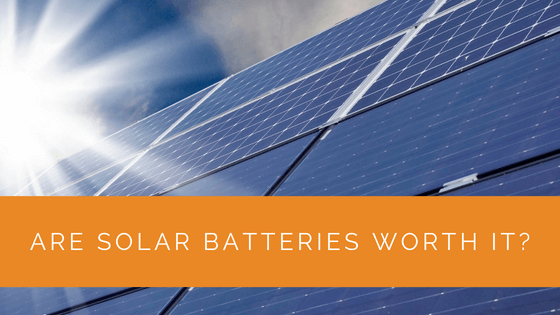
As the world shifts toward renewable energy, solar batteries, or home batteries, are gaining popularity among homeowners seeking to maximize the benefits of solar power. These batteries are designed to store excess energy generated by solar panels during sunny hours for use when the sun sets or during power outages. But is the investment in a solar battery truly worthwhile? This article delves into the advantages and disadvantages of solar batteries, the factors influencing their cost, and considerations to keep in mind before deciding whether to install a solar battery system in your home.
Contents
- 1 Key Takeaways
- 2 How Solar Batteries Work
- 3 Factors Influencing Solar Battery Costs
- 4 The Pros and Cons of Solar Batteries
- 5 Factors to Consider Before Choosing Solar Batteries
- 6 Case Study: Enhancing Energy Independence with Solar Batteries
- 6.1 Background
- 6.2 Project Overview
- 6.3 Implementation
- 6.4 Results
- 6.5 Summary
- 7 Expert Insights from Our Solar Panel Installers on Solar Battery Worthiness
- 8 Harness the Power of Solar with Solar Panels Network
- 9 Conclusion
- 10 Frequently Asked Questions
- 10.1 How Long Do Solar Batteries Last?
- 10.2 What Factors Influence the Return on Investment?
- 10.3 Is It Worth Getting a Battery for My Solar System?
- 10.4 How Many Batteries Are Needed to Live Off the Grid?
- 10.5 Are Solar Batteries Worth It?
- 10.5.1 About the Author
Key Takeaways
- Solar batteries store excess energy from solar panels, enabling you to use it after sunset or during outages, enhancing energy independence and potential savings.
- The cost of solar batteries varies based on battery type, system size, installation expenses, and maintenance, making it essential to weigh these factors before investing.
- Considerations like energy usage patterns, local electricity rates, battery longevity, storage capacity, and available incentives should guide your decision on whether a solar battery system is a wise investment for your home.
How Solar Batteries Work
A solar panel system, also called a photovoltaic (PV) system, transforms sunlight into electricity that powers your home. During the day, solar panels produce more electricity than you need, and the excess energy is usually sent to the grid. However, with a solar battery system, this extra energy is stored instead of being sent to the grid, allowing you to use it at night or during outages. This reduces your reliance on the grid.
Two primary types of solar batteries exist: lithium-ion and lead-acid. Lithium-ion batteries dominate the market due to their extended lifespan, low maintenance requirements, and high storage capacity. While more costly, they outperform lead-acid batteries, which are cheaper but less durable and require more upkeep.

Factors that Determine Solar Battery Cost
The price of a solar battery system can vary widely depending on several factors, including the type of battery, the system's size, and the installation and labor costs. Lithium-ion batteries tend to be pricier than lead-acid batteries. Installation and labor can also significantly increase the total expense. Maintenance and eventual replacements should also be factored in, as batteries eventually wear out and need to be replaced.
The Pros and Cons of Solar Batteries
One major advantage of a solar battery system is energy independence. It allows you to generate and store your electricity, reducing reliance on the grid. This is especially useful during outages when you maintain access to stored solar energy. Another benefit is cost savings. By storing excess energy during the day, you can use it at night or during outages, cutting down on grid electricity purchases.
However, there are drawbacks to consider. The upfront cost of a solar battery system can be steep, and batteries will need replacing eventually. Maintenance and replacement costs must also be accounted for. Additionally, the storage capacity of batteries is finite, meaning you might not store enough energy to meet all your needs.

Factors to Consider When Deciding on Solar Batteries
When contemplating a solar battery system, several critical factors should be evaluated. First, examine your energy usage patterns. A solar battery may be a good fit if you consume a lot of electricity at night or during outages. Another consideration is the cost of solar batteries and installation compared to alternative energy storage methods, such as generators or grid-tied systems.
You'll also want to think about the battery's lifespan and the associated maintenance and replacement costs. Additionally, assess the cost of electricity from the grid. If electricity is expensive in your area, a solar battery system could prove cost-effective. Conversely, if electricity is cheap, the investment may not make sense.
Lastly, investigate any available tariffs or incentives for solar battery systems. Some utility providers offer net metering programs, allowing you to sell excess energy back to the grid at a premium rate.
Case Study: Enhancing Energy Independence with Solar Batteries
Background
At Solar Panels Network, we specialize in crafting customized solar solutions tailored to each client's unique needs. This case study centers on a residential project where we installed a solar battery system to boost energy independence and optimize renewable energy utilization.
Project Overview
The project involved a family home seeking to decrease reliance on the national grid and secure a dependable energy supply during outages. After analyzing their energy consumption habits, we proposed a hybrid system combining solar panels and a lithium-ion battery storage unit.
Implementation
- Installation Process: The system comprised a 5 kW photovoltaic (PV) array paired with a 10 kWh lithium-ion battery. This configuration ensured sufficient energy storage for the household's evening and nighttime needs. Our team mounted the panels on the roof and placed the battery in the garage for easy maintenance access.
- Technical Specifications: We chose a lithium-ion battery for its durability, extended lifespan, and minimal maintenance needs compared to traditional lead-acid options. The system also featured a smart inverter that efficiently managed the distribution of solar power between immediate use, storage, and grid export.
- Maintenance Plan: To guarantee optimal performance, we offered a detailed maintenance plan including annual inspections, battery health monitoring, and software updates. The smart inverter and monitoring system let the homeowners track their energy usage and storage levels in real time.
Results
- Energy Independence: The installation drastically reduced the household's dependence on grid electricity. On average, the system covered 60% of their energy demands, with the battery ensuring power availability during cloudy days and nights. This autonomy proved invaluable during local grid outages, as the family retained access to stored solar energy.
- Financial Savings: The homeowners noticed a significant drop in their electricity bills, saving around £800 annually. The combined solar generation and battery storage allowed them to utilize more of their produced energy, minimizing the need to buy electricity from the grid.
- Environmental Impact: By adopting solar energy and battery storage, the household cut its carbon footprint by roughly 2 tonnes of CO2 per year. This aligns with the UK's broader aim of promoting renewable energy and reducing greenhouse gas emissions.
- Incentives and Benefits: The family benefited from the Smart Export Guarantee (SEG), generating additional income by exporting surplus energy to the grid. This incentive, along with reduced electricity costs, shortened the payback period of the system, making it a financially sound investment.
Summary
This case study underscores the significant advantages of integrating a solar battery system with photovoltaic panels. The combination not only improved the household's energy independence but also yielded substantial financial and environmental benefits. At Solar Panels Network, we remain committed to helping our clients make informed decisions about solar energy solutions, ensuring they maximize efficiency and savings.
Expert Insights From Our Solar Panel Installers About Solar Batteries Worth
Solar batteries offer a substantial advantage in terms of energy independence. They enable homeowners to store excess energy and use it when needed, making them a valuable investment, especially during power outages.
Lead Solar Technician
The choice between lithium-ion and lead-acid batteries largely depends on your budget and maintenance preferences. Lithium-ion batteries are more efficient and require less upkeep, making them a popular option despite their higher initial cost.
Senior Battery Installation Specialist
Considering solar batteries involves looking at the long-term benefits. They can reduce your reliance on the grid and potentially lower electricity costs, especially in areas with high energy prices.
Chief Energy Consultant
Discover the Power of Solar with Solar Panels Network
Exploring solar installations? Look no further than Solar Panels Network, the UK's trusted partner in harnessing the sun's potential. Our dedication extends beyond installations—we're on a mission to change how homeowners and businesses across the UK perceive and utilize energy. By choosing us, you're reducing your carbon footprint and making a smart financial move that promises savings for years to come. Contact us today to start your solar journey.
Conclusion
Solar batteries can be an excellent option for homeowners aiming to capitalize on the benefits of solar energy while reducing their dependence on the grid. However, the cost of a solar battery system and the availability of tariffs or incentives are important factors to ponder before deciding. It's also vital to consider the cost of electricity, the lifespan of the batteries, and the storage capacity of the system. By carefully evaluating these elements, you can determine whether a solar battery system is a worthwhile investment for your home.
FAQ
How long do solar batteries last?
The lifespan of a solar battery varies depending on the type and usage. Lithium-ion batteries, like the Tesla Powerwall, typically last around 10-15 years. In contrast, lead-acid batteries have a shorter lifespan of approximately 5-7 years. It's essential to account for the batteries' lifespan when deciding to invest in a solar battery system.
What factors influence the return on investment?
Several factors affect the return on investment for a solar battery system, including the cost of electricity, the availability of tariffs or incentives, and the cost of the solar battery system and installation. Your energy usage patterns and the system's storage capacity also play a role in determining the return on investment.
Is it worth getting a battery for my solar system?
Whether it's worth adding a battery to your solar system depends on your specific energy needs and usage patterns. A solar battery system may be a good investment if you desire to reduce reliance on the grid and have a reliable backup power source during outages. However, if electricity costs are low in your area, it may not be as cost-effective.
How many batteries are needed to live off the grid?
The number of batteries required to live off the grid depends on your energy usage patterns and the storage capacity of the battery system. A typical off-grid solar system often includes multiple batteries to provide enough storage to power your home during low-sunlight periods.
Are solar batteries worth it?
Whether solar batteries are worth it depends on various factors, including your energy usage patterns, electricity costs, and the solar battery system and installation. The lifespan of the batteries and the availability of tariffs or incentives also impact the decision. Carefully considering all these factors is key before investing in a solar battery system.
About the Author
Solar Panels Network leads the way in solar energy solutions, guided by a team of seasoned solar engineers and energy consultants. With decades of experience in delivering high-quality solar installations and maintenance, we are committed to promoting sustainable energy through customer-focused, personalized solutions. Our articles reflect this commitment, crafted collaboratively by experts to offer accurate, up-to-date insights into solar technology, empowering our readers to make informed solar energy choices.
A railgrinder (or rail grinder) is a maintenance of way vehicle or train used to restore the profile and remove irregularities from worn tracks to extend its life and to improve the ride of trains using the track. Rail grinders were developed to increase the lifespan of the tracks being serviced for rail corrugation. Rail grinding is a process that is done to stop the deformation due to use and friction on railroad tracks by removing deformations and corrosion.
Rail Grinder,Rail Grinding Machine,Geismar Rail Grinder,Loram Rail Grinder
Shenyang Lubang Railway Maintenance Machinery Co.,Ltd. , https://www.srmfrailwayequip.com